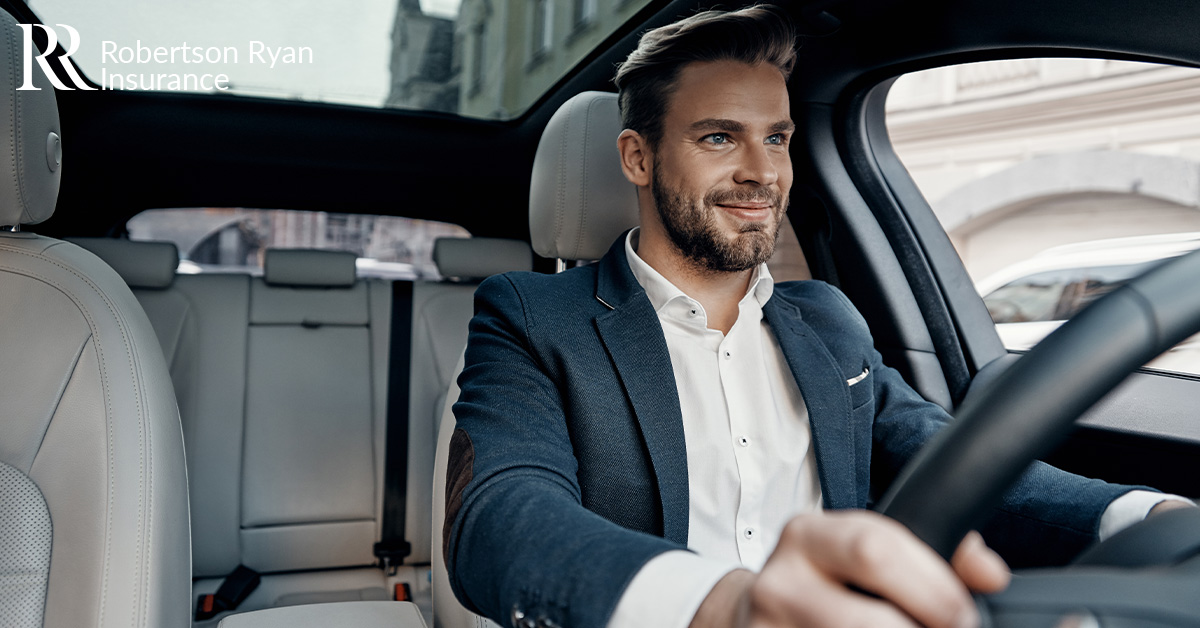Business Auto vs Personal Auto: Coverage Pitfalls to Avoid
July 9, 2025

Coverage Gaps to Watch for in Personal & Business Auto Insurance
For many people, driving a vehicle that’s provided by their employer, or a business they own, is a major convenience. Whether you’re behind the wheel of a company-owned car, or your family members use vehicles titled to your business, it’s important to understand how this can affect your insurance coverage.
Employees Who Drive Company-Owned Vehicles for Work
At Robertson Ryan Insurance, we frequently help clients navigate two common scenarios that can leave gaps in either their personal or business auto insurance protection.
Scenario 1: You Have a Company Car & a Personal Auto Policy
If you or a family member are regularly driving a company-supplied vehicle and you also maintain a personal auto policy, there may still be a gap in coverage. Personal auto policies typically exclude coverage for vehicles that are “furnished or available for regular use” that are not listed on your policy. This means that if you cause an accident while driving a company car, your personal policy may not be adequate, even if you have liability or umbrella coverage.
To address this, a Named Non-Owner or Extended Non-Owned Coverage endorsement may be added to your personal auto policy. This endorsement can help extend liability coverage while you or a family member are driving a vehicle provided by an employer. While these situations are not one-size-fits-all. It’s important to work with your agent to determine whether this endorsement makes sense for your household.
Scenario 2: You Don’t Have a Personal Vehicle or Personal Auto Policy
This second situation is especially important for business owners and employees who do not own personal vehicles and instead rely entirely on company-owned autos.
Consider the following:
- An employee without a personal vehicle drives a company-owned car.
- A business owner provides company vehicles to all family members, while no one in the household carries a personal auto policy.
If someone in these situations borrows a friend’s car or rents a vehicle while on vacation, there may be no liability or physical damage coverage at all. The commercial auto policy usually doesn’t extend to these non-business personal use situations.
In this case, businesses should consider adding the Drive Other Car (DOC) coverage endorsement to their Business Auto Policy (BAP). This endorsement extends coverage to individuals named on the policy (and often their spouses) when driving a non-owned vehicle for personal use.
Why It Matters: Without a personal auto policy or this specific endorsement, an accident involving a borrowed or rented vehicle could leave the individual, and potentially the business, without insurance protection.
What About Employees Who Drive Their Own Vehicles for Work?
When employees use their personal vehicles for business purposes, whether running errands, visiting clients, or making deliveries, it creates another layer of exposure. If they are at fault in an accident, their personal policy will respond first, but it may not be sufficient.
To protect the business, a Hired and Non-Owned Auto (HNOA) endorsement can be added to the commercial auto policy. This provides liability coverage for:
- Vehicles your business rents or borrows
- Employee-owned vehicles used for business
Reminder: HNOA coverage is secondary and kicks in after the employee’s personal coverage is exhausted. It’s wise to verify that your employees maintain adequate personal auto insurance and keep records updated.
Risk Management Considerations
- Know who owns what. Title registration and insurance coverage should align. If a business owns the vehicle, it should be listed on a commercial policy.
- Review your endorsements. DOC and HNOA coverages aren’t automatically included and need to be requested.
- Assess your exposure. Are employees using their personal vehicles for work? Are company vehicles used for personal reasons?
- Verify driver eligibility. MVR checks and proof of insurance for employees using personal vehicles can help avoid liability issues down the line.
Let’s Talk Through Your Auto Use
These scenarios can be complex, especially when personal and business use overlap. At Robertson Ryan, we are available to help you evaluate your situation and identify any potential gaps. Before there is a claim.
If you have questions about your current auto coverage or the endorsements that may be right for you, please reach out to your Robertson Ryan Insurance Agent. Or contact us today. Let’s review your policies together.
*Please note that we rely on independent sources, and recommend conducting further research or to seek guidance from a qualified industry professional, legal counsel, or licensed insurance agent as appropriate for your needs. These blog posts are intended for general informational purposes only.